Everyone Hates Aid Agencies (Part 3)
Interviews with British volunteers who do rebuilding and aid supply work in south and east Ukraine
While writing this article, I talked with Jonny, a British volunteer who recently finished a 15-month project repairing houses in a de-occupied village, about his experiences with international aid agencies. I interviewed Harrison in October in Kramatorsk, and kept back some of the material for use here.
Harrison Silver
Harrison is one of the founders of the voluntary organisation Ukraine Mission CIC and spends most of his time collecting vital medical aid and delivering it to civilian and military hospitals and clinics in east Ukraine.
Do you have any stories about large NGOs you’d be willing to share?
One group I was working with had MREs [ready-to-eat meals for soldiers] supplied by the Polish government, and we were trying to get them to units I knew, who were going on multiple-day exercises and couldn’t just be taking canned food with them. But they didn’t want to go through me; they wanted the soldiers to show up directly.
And they only had warehouses in Kyiv and Lviv, with a ridiculous amount of stuff. And the soldiers would have to arrange with them, and one person from the unit would have to take a day off the unit to pick it up. And when they got there, they would ask, how many men in your unit? And they’d say, 150. And the NGO would give them 150 meals. That’s one day’s worth of meals, and the guy spent the day driving there. Why not fill the truck? They [NGO workers] were just ticking boxes.
The worst story… It was the height of summer, and we were in Zaporizhzhia oblast, the Orikhiv area, and people were drinking water out of puddles because the dam had been hit and there was very little electricity, no running water in certain areas.
Everyone needed water. And I heard about a big NGO, everyone knows the name, with a warehouse in Kyiv full of water purification stuff. At the time I had a seven-and-a-half-tonne truck that was going back and forth through the country. They agreed I’d take a lorryload of stuff, and I set up people in the area who would distribute it.
And I went there, and I was told I don’t have the right documents. I asked, what are the right documents? And they couldn’t tell me. So I kept coming back with different documents, because people were potentially dying due to this, and there were reports of waterborne diseases going around. I was going back and forth, back and forth with the NGO, and it turned out the kit had been sitting there since almost the start of the war.
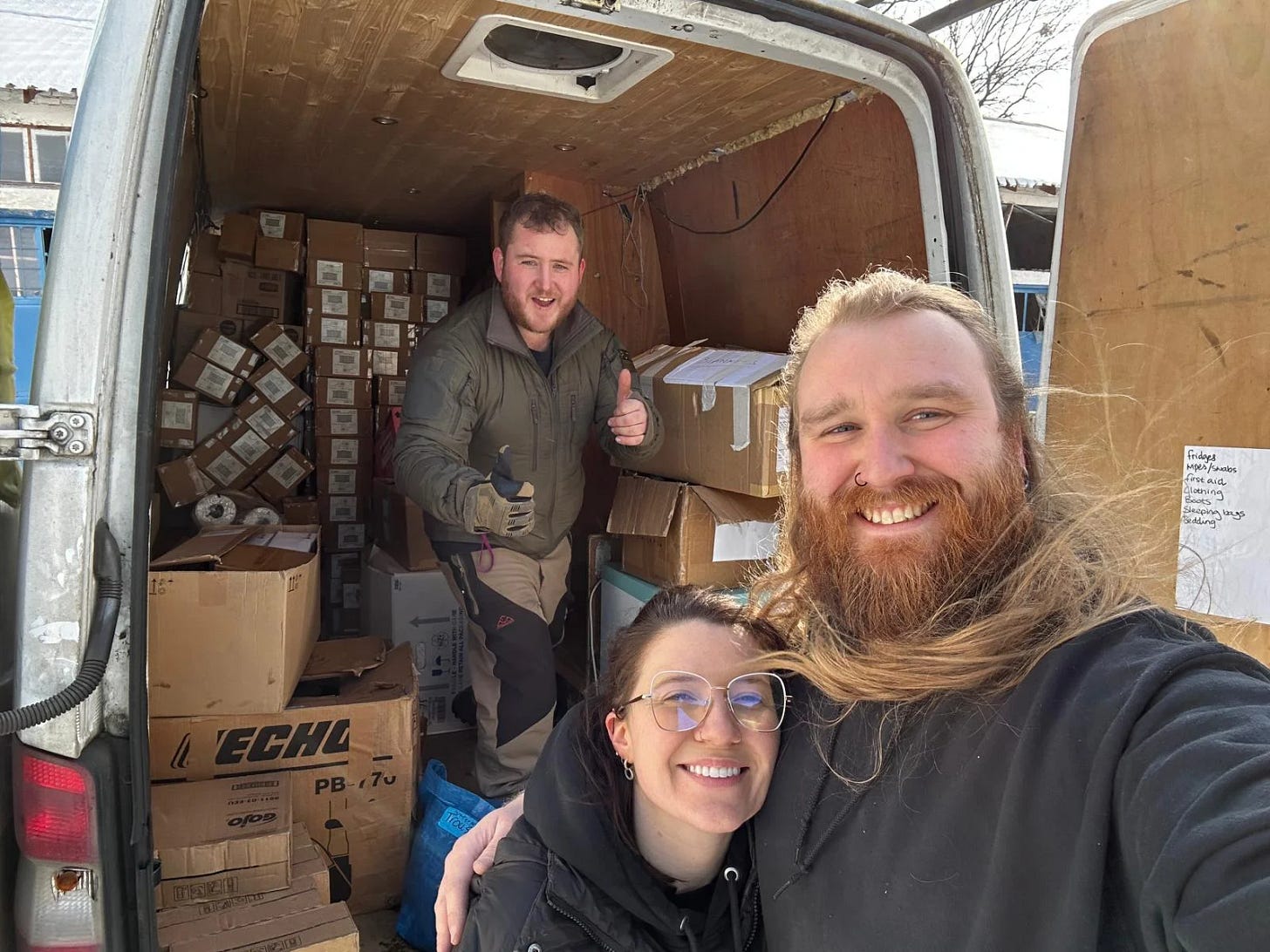
Is it still there now?
Yes! And there was another warehouse where I was picking hand cream up for another charity. It hurt me a bit that this [hand cream] was what I was doing, but I wanted to help out this charity. They filled the truck with eight tonnes of stuff then said, we’ve got another warehouse and they want to give you some stuff. I walked in, and it was super organised.
They had big containers full of extension leads and water purification kit and generators and all that sort of stuff all lined up all perfectly in this massive warehouse. And they were really generous, they gave me cables, filled a few boxes of really good items. But when we walked into the main hall there was a mountain of clothes with two ladies on the top sorting through it. It didn’t even feel real; I was looking at a mountain of clothes. The stuff at the bottom must be rotting. And it’s such a tragedy that there are still charities taking lorryloads of clothes and stuff like that out. The money that’s gone to pay for the fuel and logistics could have gone to taking in something more useful. Though it’s OK to take some jackets and stuff in the winter – warm stuff, blankets.
Sometimes in towns they’re giving out food to people who aren’t hungry. When you go another half an hour down the road, it’s apocalyptic, but the big charities won’t go there, and a lot of the little charities as well, because it’s just too dangerous.
Do you find that people in the de-occupied territories are hoarding aid?
I've seen it a bit, where they're showing up and grabbing things, literally snatching clothes out of trailers. And they’re wearing quality jackets and stuff like that already. But you know, if you were in that situation, I guess you’d do the same. There have been cases where I've seen people handing out food parcels – big charities give them out in boxes so you have everything, you've got your oil, your meat, your fish, and your carbs in there – and the aid group leave, and then the babushkas sit on the side of the road and sell the boxes.
In the early days, everyone really needed help, and you were a lifeline to those people. But now the situation is stable in some areas and not in others, but they’re still delivering to those stable areas and people have got more than they need.
So I don't work with those charities because I know that's what they do. There are charities here [in the Donetsk region] as well, and the sad truth is they do go out and do the good work, but then they spend quite a bit of time in Kyiv or in Kharkiv doing events for kids. That’s great, but they're having to do that to get the fundraising, where they could be spending it somewhere else.
You've got to get your pictures of cute kids…
Yeah, essentially.
The reason the problems are so obvious in Ukraine is that there’s never been a situation like this where you've got all these people volunteering in this way and you can see that the Red Cross, the big charities, are not really here.
They're in the big cities, and I see this all the time: they're responding to a missile strike and you've got this picture of someone in a Red Cross jacket, hat and helmet who’s got a dirty face but their neck is clean. And they’re carrying someone wrapped in a towel and it’s got the Red Cross logo shining. And they’re actually there the day after the strike! I’m pretty sure there’ve been strikes in Kharkiv where they drove there from the base in Kyiv. But that’s speculation. I know some Red Cross people died here recently. I assume they were Ukrainian.
I even have this with my own family. I don’t speak to them much about what I do, other than when I see them. But my grandmother was talking about how horrible the war in Ukraine looked on the news, and my mother asked if she would consider donating to me. And my grandmother said, oh, no, I donated to the Red Cross!
Jonny
Jonny is a Brit who went over to Ukraine in March 2022 because, according to him ‘I was tired of bullies. Tired of the Trumps and the Boris Johnsons and the Putins of this world.’ His work, alongside a small team, is funded by private donations and occasionally receives some ‘medium-sized charity help’ through Ukrainian contacts. They have just finished a fifteen-month project rebuilding destroyed houses in a de-occupied village.
Jonny had quite a lot to say on the subject of big aid, so over to him!
The Red Cross
In spring 2023 we were doing humanitarian work mostly between the cities of Mykolaiv and Kherson. Drinking water was the major problem so we started leaving thousand-litre barrels in villages and carrying eurocubes [very large water containers] around to pump out water. That meant we could build a routine of places we had to go, and we were in contact with people in the village so they’d message us if the barrel was getting low. We didn’t go through administrations.
When the Russians blew up the dam, we took on two extra volunteers, got a couple of trailers through a Ukrainian partner organisation and went out every day with barrels strapped to the roof, on trailers, as many as we could fit on, to the villages west of Kherson city.
We saw a brand new Red Cross [water supply] lorry in Komyshany, and people were queuing up because it’s only got one tap. And this is a location within artillery range, within everything range, a nice juicy target for the Russians to hit a bunch of civilians. They turned up a couple of times with their brand new lorry and we barely ever saw them again. Though the Howard G. Buffett foundation turned up after a while, with lorryloads of water bottles, which was a bit of a free-for all, but ultimately they were getting water into the area.
UNICEF
UNICEF were bringing in water from Dnipro [to Kherson city] by the lorryload through a Ukrainian contractor. A smaller lorry was then supposed to deliver it to locations that the local administration said they had set up around the city, but the local administration hadn’t actually put the barrels out. It lied to them, or got it wrong, or whatever.
So we weren’t aware that we were the only distribution method for water in the area. We did this for three months, to 80 locations or so, and we were working around the clock so it wasn’t sustainable for us, and not an efficient medium- or long-term way of distributing water. It’s too small. So we tried to pass it on to UNHCR and UNICEF. We handed them this information on a plate: right, these are the locations we’ve got, these are the contacts at each location, this is roughly how much they’re using, you need to get water from Point A, which is literally just outside the city sign of Kherson, to these locations.
UNHCR did eventually do a bit, though it wasn’t particularly well organised. UNICEF, though – and I think this is largely to do with one or two particularly toxic characters in their organisation – did deliveries for a week then cancelled them pending a visit from their representatives to determine the need. So they sent your typical UN delegation from Kyiv: three armoured land cruisers, people with body armour and no IFAKs [Individual First Aid Kits, which along with helmet and body armour are the most basic requirement for civilians in danger zones] and no clue, and a security guy. They went round some of these locations.
Meanwhile babushkas were coming up to us and asking why their water deliveries have stopped after three months. Some randomers in ratty old vehicles could keep a regular supply but as soon as UNICEF took over it mysteriously stopped after a week.
We actually saw an internal email and it said that, yes, they had determined that there was a need, ‘and’ they were going to cancel the supply. Not ‘we’ve determined there’s a need but we have to cancel it’ because of costs or sustainability or danger or whatever.
There was no shame to it. We were in personal communication with the woman so there was no reason she couldn’t have dropped us an email and said, ‘unfortunately, for whatever reasons, we’ve got to stop for a week to assess, or we have to cancel, can you guys carry on for a bit until we get something else sorted?’ She just cancelled and didn’t tell us. When we called her asked what was going on, she was like, ‘I don’t have to tell you that.’ Totally hostile conversation.
She was saying we’re not a partnership, she doesn’t owe us anything. That’s literally true, and to be fair UNICEF had got the water into Kherson, and had the contractor in place to make local drops, and it was the local administration screwing them over. But because they were all sat behind laptops, they didn’t know what was going on.
There’s a total lack of humanity with regard to the people being looked after, and incompetence to a degree that beggars belief. If that was in the private sector, someone would have come down and bashed their heads together and said, we’ve got barrels around your city in good locations, the administration are clearly buggering us about so the contractor needs to be reporting back to you about it. You need to take accountability for the water. But instead of managing the situation, UNICEF employed a whole bunch of other people to monitor the barrels. They wouldn’t even drive around with the contractor so they got into independent transport to get to the location when each barrel was filled and check it.
UN Meetings
We went to WASH Cluster [Water, Sanitation and Hygiene, one of eleven UN ‘cluster’ groups established to co-ordinate aid of different kinds on a global scale] meetings with the big boys – UNHCR, UNICEF, Red Cross, you name it. You go to the first one and you’re a bit nervous, but it’s just a bunch of people sat behind laptops. My colleague did a PowerPoint presentation on how to set up a thousand-litre barrel, which seems an embarrassingly basic thing to be teaching so-called professionals. But we would go out and see thousand-litre barrels delivered, and they didn’t have a tap on the bottom. And the people in these isolated villages don’t have the money for petrol to go to the city and buy drills. Plus they sometimes don’t feel entitled to start drilling holes in barrels that some organisation has put in. For all they know, the organisation might come back and pick the barrels up.
We went to one village between Mykolaiv and Kherson, and USAid had got five ten-thousand-litre water bladders there. Most other places had none. And the bladders are only a couple of feet high and they’re sat on the floor with a standpipe that’s a foot high. So the bladder can only be emptied fifty per cent.
The only time I've ever seen one of those water bladders installed properly is in Posad-Pokrovs’ke, halfway between Mykolaiv and Kherson, where the mayor and the local people put it up on a really nice pallet structure. Then we were in a water cluster meeting and one of the ladies sat behind her laptop whispered to the co-ordinator, ‘Yeah, but a pallet isn’t strong enough to hold a thousand kilograms.’ And that’s exactly what pallets are designed for!
There are some good players involved in the WASH Cluster. There was a smaller group, I can’t remember their name, going around putting reverse osmosis filters in. That was great for us, as it took a couple of the villages we were supplying offline because they had their own filter system. Water Mission were good, going around with vans with systems that could suck up a thousand litres of dirty water, filter it and decant it. But there’s nothing like that coming from the big bods unless it’s a smaller group requesting money from them.
UN Field Trips
We joined one of those UN delegations that come down to Kherson once. So there’s three armoured land cruisers, everyone on a day out from Kyiv, [to do an inspection of] a newly built IDP centre in Kherson, which needed, I think, two new washing machines and three new water boilers. It would have been cheaper to just buy them a washing machine and boiler and say, if you get busy and need more, give us a shout. Not go for a day trip with a security guard that doesn’t know his arse from his elbow in a land cruiser that’s probably going to cost five hundred quid in fuel alone to get there and back, times three, plus salaries, plus drivers. It was probably a five grand journey, to look at an empty building.
And then we bugged out after that, we'd seen enough, and we were like, this is just ridiculous. It's just a day trip out from Kyiv to somewhere where they can justify putting on the body armour, even though we were an hour away from actual danger. Kherson was dangerous at the time, but putting their armour on in Mykolaiv just illustrated their lack of knowledge.
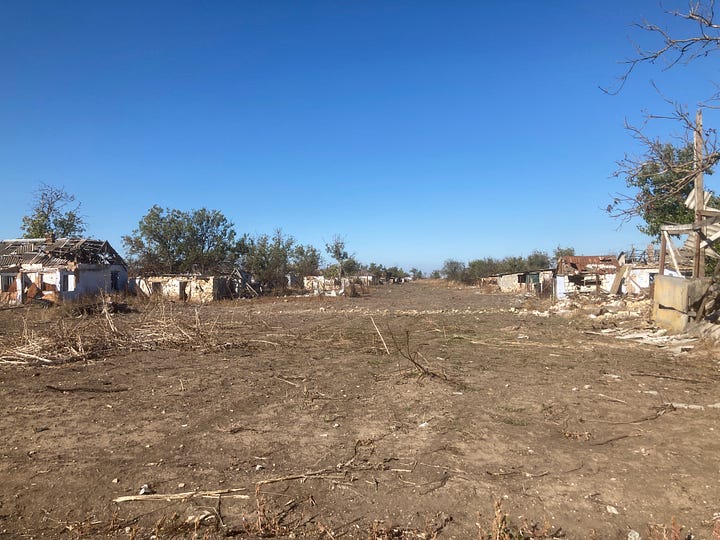
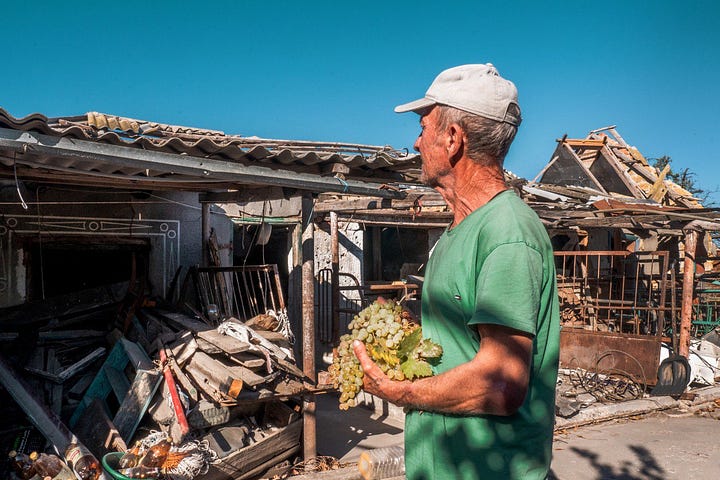
Rebuilding a Village
With the reconstruction project, UNHCR came out and took about five minutes to decide the place was too damaged and the capital cost per person to fix anything was too much [for them to do the work themselves]. There was one good guy in there who said, look, we might be able to help with this, and a correspondence started. I’m sure he and a couple of others had good intentions, but the way these things are managed, it’s not open. In the private sector you know where you stand, but these people just go quiet because they have no incentive to do otherwise.
So we came up with a potential pilot project of us doing the structural work and them supplying all these building materials they supposedly had sat in a warehouse in Dnipro. We requested $150,000 or $200,000’s worth. We jumped through so many hoops – the amount of time and effort we spent on the proposals was just unbelievable – and it all just fizzled out after a few months. Nobody had the decency to phone us and say what went down, so we still don’t know why.
Obviously it is a punt on their part to be partnering with unproven independent volunteers, we understand that. So first we had some big bods come out and say reassuring things. We’d planned to fill in any gaps in the building materials they supplied, provide the labour with our Ukrainian guys - we had nine guys working for us at one point - and do delivering and unloading and buying. But, rather than subsidising the more expensive builds they pared it down and pared it down, and ultimately only sent the internal materials for three properties, a couple of doors and boilers and stuff like that. Maybe they were trying to tighten the purse strings, or phase themselves out of it, I don’t really know.
If they’d had to pull out and say, no, it’s too capital intensive for the amount of people we’re helping, we can’t do it, that would be understandable. But they didn’t. They just buggered us about for months then went quiet. Which made us look like dicks, because the residents were applying to the UNHCR but we covered the paperwork, the labour, the lot. And we’d said, hey, we’ve got these materials, we’re going to repair your house or rebuild it from scratch because it’s so badly damaged. We’d got a relationship with these people, then all we could say was that the UNHCR had let us down and we couldn’t fix their house even though we’d implied we could. Which wasn’t very nice. We were able to use our own funds to rebuild the houses of people who had stayed in the village, but we had to let down the people who hadn’t come back but wanted to.


Unused Equipment
Posad-Pokrovs’ke was a hive of activity for a while in the summer of 23. There was loads of demining going on, and loads of aid and machinery going in.
Then we went back the other day, and there’s probably a couple of million quid’s worth of brand-new plant machinery, bulldozers and swing shovels just sat there. I assume someone from the UN or USAid or whoever said, right, what machines do we need to rebuild a village? And they chose half a dozen completely wrong machines – too big, and the wrong design. Somebody probably picked them out of a catalogue, spent a couple of million, paying through the nose, I’m sure they weren’t getting good deals. And it’s just parked there. It’s trapped, because it’s not like anybody can sell it and use the money for [something better]. I wouldn’t be surprised if that equipment is sat there for ten years.
Are there any large agencies you feel positively about?
The tarpaulins provided by the big orgs are really useful. Keep printing them, guys, well done!
Caritas set up representatives and helped with windows and doors and things in the village we were working in. One of my regrets is that we didn’t make contact with them properly, as they’ve done a lot of work in a lot of villages, and they’d employ local builders and they seemed to get a lot of work done. I don’t know if it was efficient, but I’ve seen a lot of work I know is theirs, and a lot that looked pretty similar. I think they’ve done a hell of a lot of reconstruction.
I think a lot of the medium-sized ones are in touch with what’s going on enough to be proactive. That probably goes up in size to Caritas, but the big ones are just shocking.
Do you think there’s anything that could improve the situation with the big agencies?
A hundred per cent you need people on the ground who have the ability to solve problems and implement practical solutions, and manage other people. You can pay them whatever they want, and you’d have to give them autonomy. Then they can go in and bash heads together, and tell the administration that we’ve supplied equipment back in January and it’s now the middle of summer and there’s a water crisis and it’s all just sat in a warehouse, what’s going on? What are you lot doing?
Addendum: some things aid agencies HAVE done
I myself have seen aid agencies doing useful work around Ukraine. In fact I look out for examples so I can try to be fair to them. Here’s a list of everything I have personally encountered:
In the deoccupied village of Mospanove, Kharkiv region, June 2024, the UN were delivering packages of useful items such as bedrolls, for every family in the village:
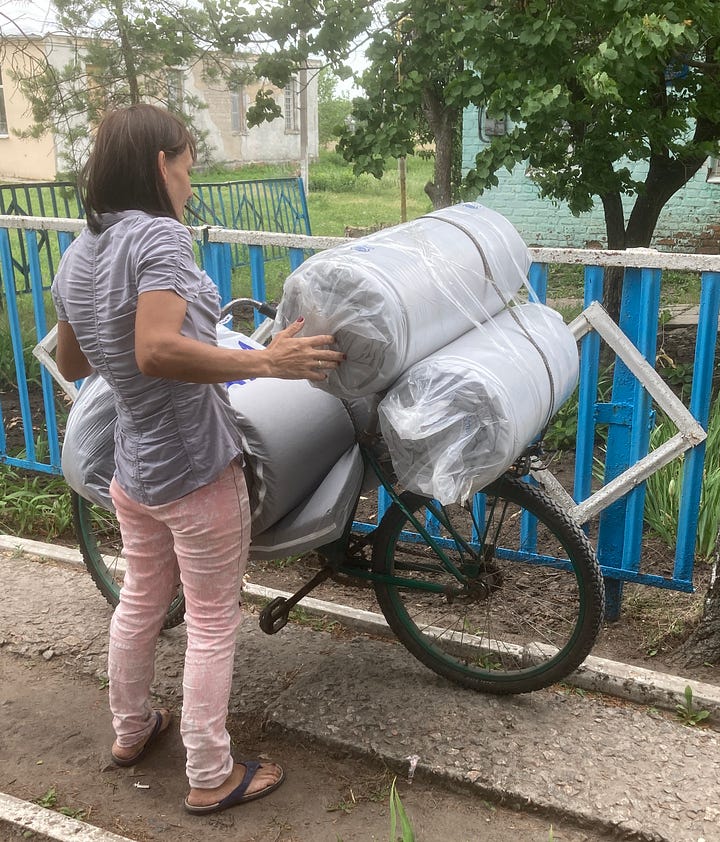
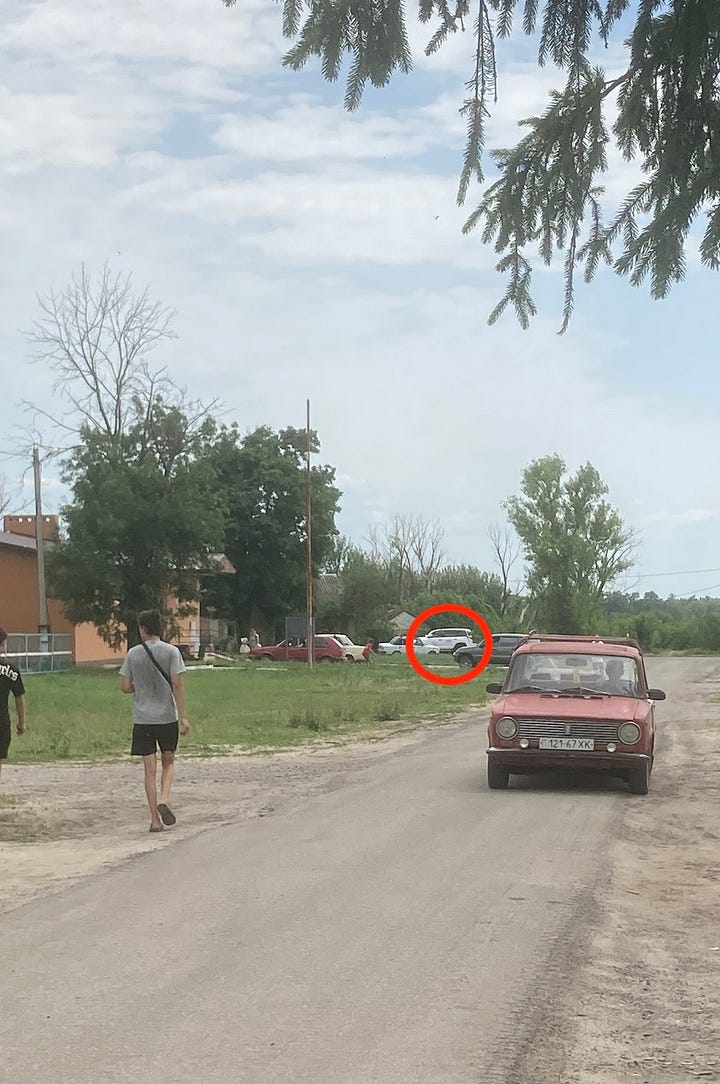
Some of the temporary roofing material I saw in Kherson region in 2023 was stamped with the logo of Samaritan’s Purse:
Post edited to add from Felicity Spector in the comments below: “Samaritans Purse has supplied 17 big reverse osmosis water purifiers in Mykolaiv and trained local church volunteers to operate and maintain them.”
You often see low-cost items like bags, or tarpaulins providing temporary cover in various deoccupied territories:
In addition to those colourful installations in train stations, I’ve seen an advice tent in Zaporizhzhia, which is sometimes open, and perpetually deserted seating areas in a couple of the Kharkiv metro stations:
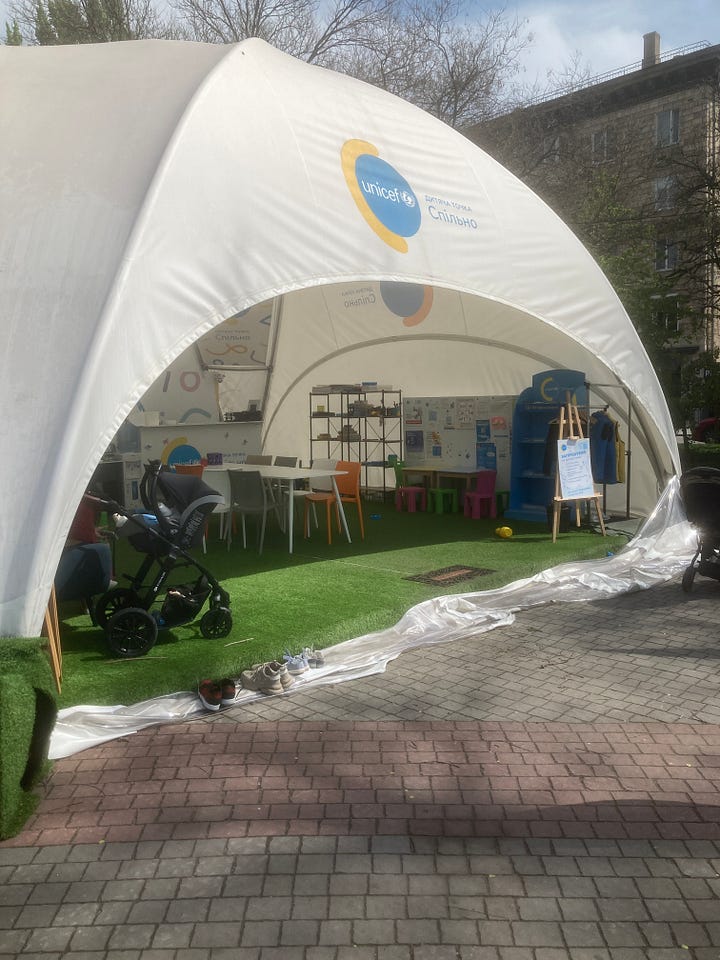
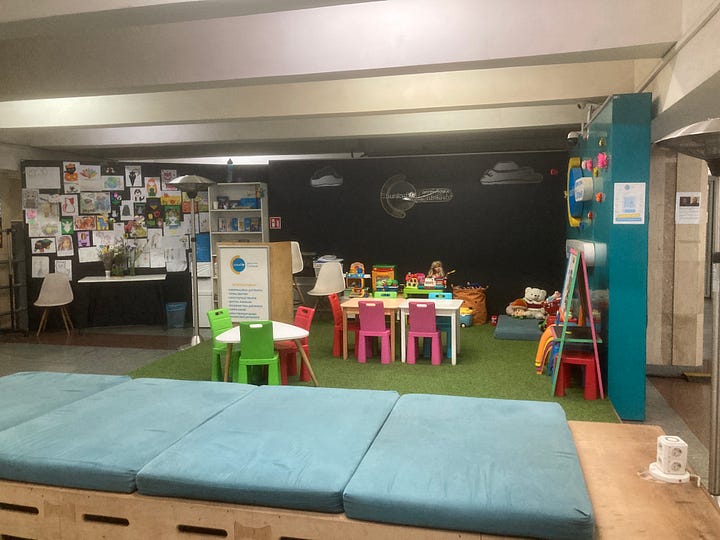
Left: central Zaporizhzhia, May 2024. Right: Kharkiv metro, May 2024 I heard a woman in a train travelling between Kyiv and Poland saying that she was a UN aid worker, and a physiotherapist in a café in Kharkiv chatting with her interpreter about their work for the Red Cross.
I have a copy of a heavily-branded kids’ activity pack produced by UNICEF in tandem with Ukrainian government organisations as part of a much larger mine education project, dating from before the full-cale invasion:
There must be many other positive examples, but that’s honestly everything I’ve personally seen during the eight months I’ve spent in Ukraine over the past two years, though admittedly I only started consciously keeping track some time in autumn 2023. At second hand, I’ve heard praise for the work of World Central Kitchen: Harrison and others have told me that they visit places other aid agencies don’t. They also support a lot of local initiatives, such as that of Ihor Vinohradov, an IDP from Pokrovsk, to distribute pizzas in the Donetsk region in 2022, which he talks about in Freefilmers’ zine Zamotka (contact them via their Instagram to purchase a copy).
Even well-intentioned programmes can backfire if they don’t incorporate local knowledge. A story I was told by a member of the Ukrainian military: a large foreign NGO organised a summer camp with sport, sunshine and therapy for children from deoccupied villages. Sounds great! But when they went around trying to get families to sign up, doors were shut in the aid workers’ smiling faces. Why?
The parents thought the foreigners were trying to steal their children, because that’s what the Russians did. A Ukrainian NGO would be both less likely to trigger that reaction, and better able to understand it if they did.
Ukrainians really do know best about their own country, and we need to help them in the most practical ways, with the fewest intermediaries, as possible.
Links back to Part 1 and Part 2
Thanks for reading. This blog is now going on hiatus for the holiday period, but will return in January.





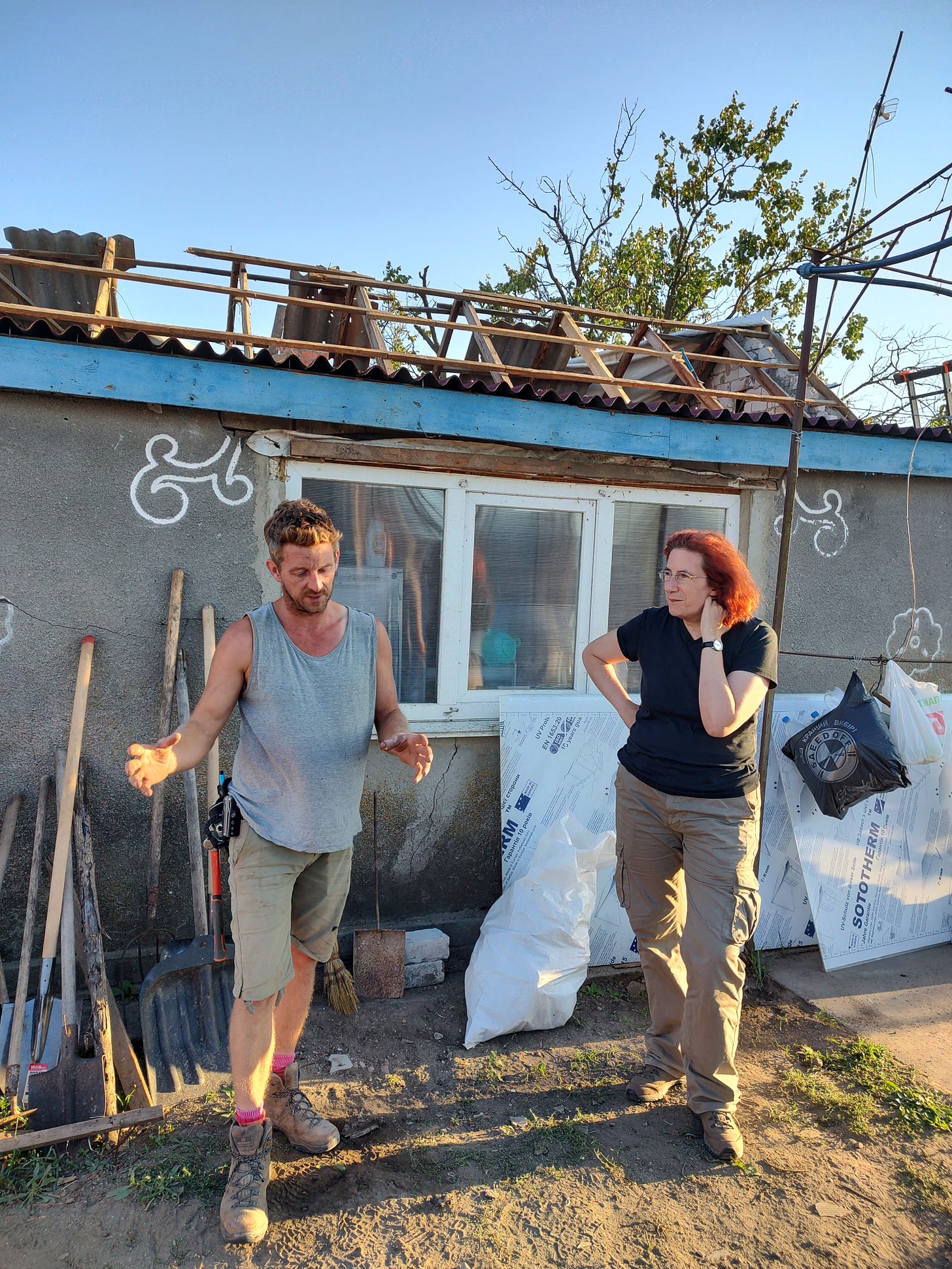



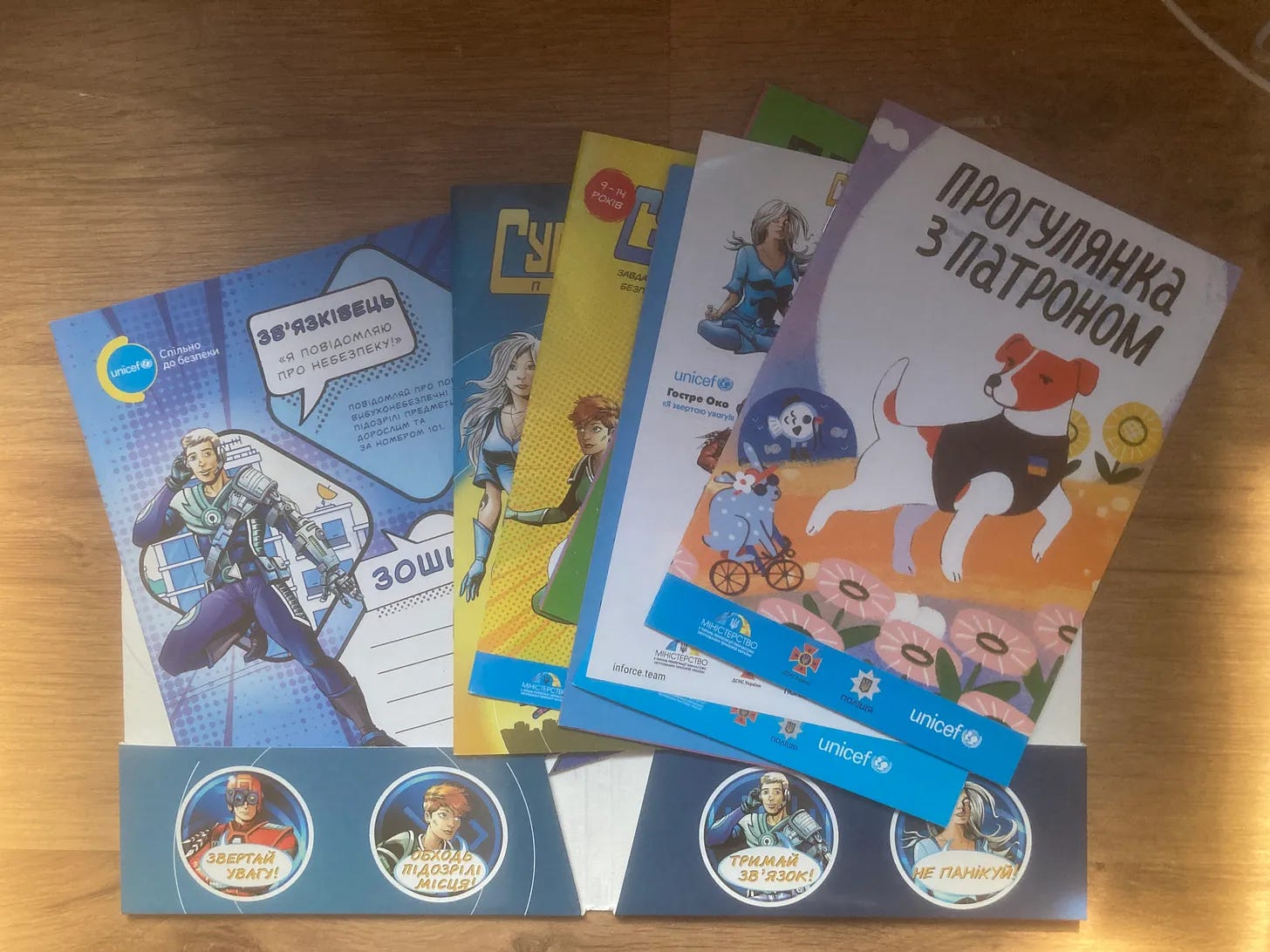
It is so frustrating to hear of the atrocities perpetrated by the Russians and see pictures of the carnage caused by Russian troops in Ukraine. Pure evil! With Trump coming to power Ukraine will have another enemy to deal with along with Putin. Your work and the reporting you do Anna is so important. It will form part of the historical narrative of the Russian invasion and serve to provide eye witness accounts of the destructive nature of the Russian troops. Stay safe Anna.
Thanks for this. Always good to read these stories about what is happening on the ground.